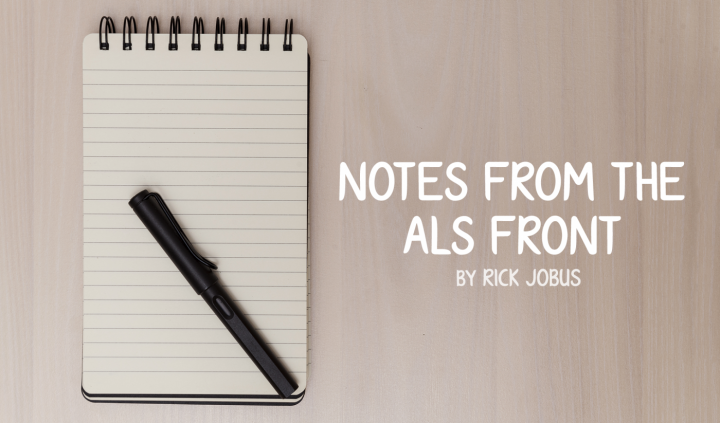Talking Trash with ALS

The ancient Greeks first introduced the term “parrhesia,” meaning “free speech,” around the end of the fifth century B.C. From a literal perspective, ALS has taught me that the concept is a misnomer. Like nearly everything else, there is a price to be paid.
In the case of speech, that cost can be expressed as the effort expended in creating air pressure. This pressure is produced by the diaphragm compressing the lungs, causing vibration of the vocal cords across the larynx, resulting in sound. That sound is then modified by muscles of the vocal tract and mouth into different vowels and consonants. With the diminished core strength that ALS precipitates, coupled with inevitable bulbar impairment, that toll is an increasingly difficult one to dole out.
This reality has been a bitter pill for me to swallow. More so than most people, I am highly energized by dialogue with others. (I am heavily extroverted, according to the Myers-Briggs type indicator.) Add to that my unusual fondness for public speaking, and the result is an individual whose mental well-being is heavily reliant on verbal discourse. Consequently, I’ve raced down sundry paths in the hope of forestalling the inevitable.
During the course of that pursuit, I’ve worked with four speech therapists and two acupuncturists. At the direction of the speech therapists, I’ve chanted “PA-TA-KA” repeatedly and rapidly enough to resemble a protracted automatic-weapon exchange. I’ve undergone numerous rounds of electrical stimulation of my throat and facial muscles.
Under acupuncturist supervision, I’ve had countless needles dangling from my temple, jaw, chin, and neck.
I even coerced a doctor to prescribe Nuedexta (dextromethorphan and quinidine) off-label, based on anecdotal evidence of slight speech improvements.
Alas, none of the interventions had anything but a temporary plateauing effect, which leaves me in my current state: a man nearly without a voice. The resulting damage to my psyche is palpable, but there are practical ramifications as well.
For example, I recently had to confirm my identity over the phone as part of a credit card fraud resolution. It took 10 contentious minutes for me to accurately convey my name, date of birth, and the last four digits of my Social Security number. Only after a supervisor witnessed and approved my labored information delivery could we proceed.
There are less mission-critical tasks in which clear articulation can be beneficial. Take the interaction with a voice-activated television remote for programming selection assistance. If the request is unclear, it produces unintended retrievals. A search for “The Sting” yielded “The Shining” — both notable films with great casts, but hardly the same genre. The query “What are the times for Bollywood?” brought back “Once Upon a Time … in Hollywood.”
Thankfully, some good has come out of the erosion of my gift of gab. In a “mirror, mirror on the wall, who’s the [fill in the blank] of them all?” sort of way, my garbled messaging occasionally can be accidentally affirming. The other day, I attempted to ask my wife about our dog’s reaction to a change in his hygiene routine. My intention was, “Does Nuke like his new bath soap?” What she heard was, “You move like an athlete.” When I mentioned to my stepson on an unseasonably warm day last week “to not let the cool air out,” he thought I was complimenting him on his new haircut.
Those experiences had me tempted to run an experiment. I wonder what my audience’s reaction would be if I were to randomly utter a series of nonsensical guttural bursts, such as “Kwa zifoo quequoy muhine bobon ux pocepity jidl veadol truge.” Further, I was curious as to whether my expression might color their reception. But then I realized that version of a parlor game is played out every time that I attempt phonation.
Long ago, during summers between spring and fall semesters of college, I worked on a custodial crew. One of the full-time veterans had a dim view of the value of temporary help offered by anyone on hiatus from a higher education pursuit. He often invoked a crude colloquialism regarding my aptitude and potential for peer-level contribution.
Looking back, I must admit that in many ways, he was correct. However, over time, and largely by virtue of experience gained via necessity, many of my erstwhile knowledge gaps have been filled. Today, I can fairly say that I “do know s**t from Shinola” — only no one would be able to decipher it.
Oh, the humanity!
***
Note: ALS News Today is strictly a news and information website about the disease. It does not provide medical advice, diagnosis, or treatment. This content is not intended to be a substitute for professional medical advice, diagnosis, or treatment. Always seek the advice of your physician or other qualified health provider with any questions you may have regarding a medical condition. Never disregard professional medical advice or delay in seeking it because of something you have read on this website. The opinions expressed in this column are not those of ALS News Today or its parent company, Bionews Services, and are intended to spark discussion about issues pertaining to ALS.







Dagmar Munn
Rick, I am so sorry to learn that you are losing your voice. As a fellow pALS who is dealing with the same issues, I've found that there are innovative ways that allow us to 'keep on talking.' It's sad that Speech Therapists don't encourage pALS to pursue these techniques - - but for me, at least, they are working.
First, is posture: sit tall (use pillows if necessary). Draw yourself up as if you are a cobra snake ready to attack. Then comes diaphragmatic breathing. Practice this daily. Try to speak from the belly rather than the upper ribcage. Speak with a wide grin/smile (helps lift the soft palette) and move consonants like "kah" "gah" more forward in the mouth. Note where they initiate now, and try the same sounds only 1/2 inch forward. Finally, daily humming and imitating the sound of a siren...find a new pitch for your voice. It might be higher or lower (I've learned to accept a lower sounding voice), but find one that feels better for your vocal cords.
Don't give up! I first began losing my voice 5 years ago...and didn't accept my Speech Therapist's recommendation to "just bank my voice." I invested in daily focus and practice and wrote about it here: https://alsandwellness.blogspot.com/2018/03/als-dysarthria-use-these-innovative.html
Good luck to you! Let me know if I can be of further help.
Rick Jobus
Dagmar, thank you for the kind overture of tips! I'm trying as many as is possible.
Bob Cunningham
Does anyone else get tired of reading the this testing and that testing might be a link, with the ever sinking feeling that it is what it is. There maybe a cure Someday, just not for us.
babumjane
Whenever I read an article saying they are working on something but not in your lifetime but you should be proud to know that someday someone will benefit because of you it make me want to puke. Is your life worthless?, does it not count? Yes it does but you are treated like lab rats. Sorry I am so blunt but I am sick of reading this type of info. I want a cure and I want it now. They are out there but the big bucks won't come into the greedy labs to put it out there. I wrote 16 letters to CEOs and CCOs of eight drug companies, way before the virus started and I never received one reply. I asked them why money came before saving lives.That is why no one answered because they are greedy, evil people. In my Opinion!!!
Young people have no hope because of these greedy companies and our president saying he passed the Right to Try act. Try What?? One company gave a drug to a woman, one woman only and it cost her 35,000. Yet we give trillions to other countries that their crooked governments never use for what it is intended for and we still keep giving. I say it is time to save our citizens and not later but NOW. I write daily to our president, I know he is very busy but maybe someday, someone will listen. I pray for all of you including my daughter. God Bless you all.
Suzanne Huffer
Is there any research on how long ALS may have been present before diagnosis in a body. Familial ALS I can understand is present, if not active, from birth. However, I never see any references to early, early symptoms of ALS such as 3-5 or more years before it becomes obvious something is seriously wrong.
Dan D Montgomery
I lost it…......
I took off down the road towards Arizona, and I lost it, at the Phoenix VA. They told me I had 3 to 5 years left. No, I ain't been the same since. My heart's as hard as this old desert caliche dirt.
How am I today? Some days are better than others. Some are mothers. I ain't even gonna lie. Some days, I don't wanna get up, I just wanna give up. Don't even get me started on some nights.
I guess I could always apply for another clinical trial, but why bother? Hell, they won't even pick up their phone. Got no pride left to swallow, so tomorrow I'll try again to just move on.
Some days are better than others. Some are mothers. I ain't even gonna lie. Some days, I don't wanna get up, I just wanna give up. Don't even get me started on some nights. I took off down the road towards Arizona, and I lost it…......